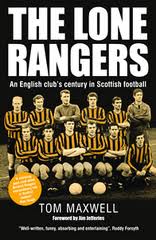Book Review: The Lone Rangers (An English club’s century in Scottish football) by Tom Maxwell

Anyone expecting a season by season analysis, replete with league tables, appearances and goal scorers of Berwick Rangers “…century in Scottish football…” will be disappointed. What The Lone Rangers does provide is a book which tells of the highs and lows, the characters over the years and what it means to be a Berwick player, manager and fan in a witty and insightful manner. The 163 pages give the reader so much more than any set of statistics ever could.
Quite simply this is a book I couldn’t put down. From the Prologue where the reader is introduced to the author Maxwell at University, through to the Epilogue where Maxwell the journalist and fan is attending the Berwick Rangers v Celtic Scottish Cup game – the passion and understanding of what it is to be a supporter is evident. Throughout this publication, Tom Maxwell captures and uses the language of the terraces, because he has experienced the ups and downs of following his team. Set against that, the author uses his journalistic skills to good effect and so enables the pages to come alive with both humour and perception, through his research, interviews and anecdotes gleaned for the book.
In the opening chapters, there is an exploration of the identity of Berwick-upon-Tweed and its inhabitants (a town that has changed hands 13 times between England and Scotland) and discussion about the exact location of the border. If there is a conclusion, it is that some see themselves as English, some as Scottish, but all as Berwickers. Indeed it seems nothing is quite straightforward with the club, as Maxwell relates how the club celebrated its centenary in 1991, only to discover that in fact the club was not founded until 1894.
As you travel through the book, Maxwell introduces characters (whether players, managers, club officials and fans) that tell the story of the significant moments in The Borderers history. Included are Tom McQueen (father of Gordon [ex Leeds and Manchester United and Scotland International]), who came to Shielfield Park in 1957. Tom McQueen played in goal and also worked as groundsman, but was known for his kicking power. When asked if he could kick a ball to the opposition penalty area, McQueen responded, “…oh aye…no problem…I don’t know what I’d do with these balls they have know – I’d lose them…”
Another with a tremendous kicking power was Ken Bowron who scored 109 goals in 138 appearances in two spells with Berwick. Bowron returned to Berwick after the clubs most famous result and a period under the management of Jock Wallace who Maxwell details as “…strict disciplinarian, control freak, semi-masochistic…” That famous result was of course the 1-0 over Glasgow Rangers in the Scottish Cup in January 1967 and Maxwell dedicates a Chapter to the event. Maxwell brings to life the character of Wallace and his time in charge of Berwick and the impression he made on players later in his management career such as Gary Lineker.
However, that team from 1967 was quickly disbanded and as the seventies dawned a new Berwick legend was starting out. Eric Tait played as a trialist in January 1970 and holds the records of most League appearances and goals for the club. He played in every position and was player-manager from 1983-1987. Tait was a player during the 1978-79 League Division Two title winning season, under the stewardship of Dave Smith (later voted the clubs Player of the Millenium). The interview with Smith by the author (in a Dundee branch of Burger King), typifies Maxwell’s ability to still be a fan, but still get the information he needs. One little gem from Smith is his laconic response to being asked about his playing days with George Best in L.A. “…well…he played with me…”
As the book gets to the late 1980’s, figures such as Jim Jefferies and John ‘Yogi’ Hughes get woven into the fabric of Berwick with the club going 21 games unbeaten in the 1988-89 season. You would have expected that a run of this magnitude would have meant promotion. However, given the number of draws and the horrendous start to the season, all that it meant was that Berwick finished 4 points clear of bottom placed Stenhousemuir! Hughes goals not only helped Berwick on the pitch, but his sale in November 1989 to Swansea City brought much needed funds to Shielfield Park.
Like many other clubs, Berwick has had it financial problems and Maxwell does not shy aware from detailing the problems that occurred and which in 1992 nearly saw the club close and go out of business. The nineties were indeed a see-saw period for Berwick as they bounced between Scottish League Division Two and Three. Their last honour was back in 2006-07 as Third Division Champions and Maxwell focuses on ex-player Gary Wood, a policeman now, in the books final chapter. As with the opening of the book and throughout it, Maxwell probes as to what makes Berwick a unique club. Wood like others acknowledges the influence of its geographical location and the divide this causes, but points to it as something positive rather than negative.
Berwick Rangers FC has a unique place in football and Tom Maxwell’s telling of it is a story worth reading.